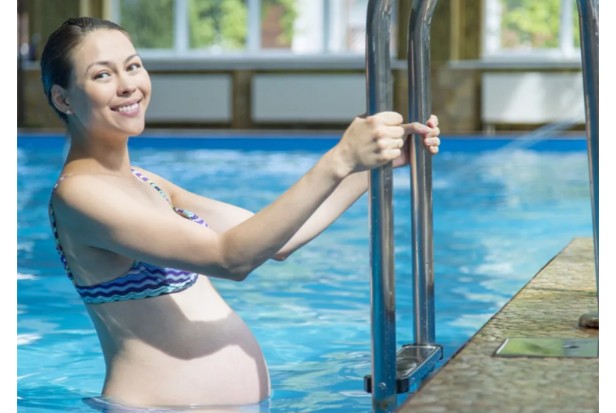Can You Swim In A Chlorine Pool While Pregnant – Is It Safe?
You might want to be able to stretch, ease sore muscles, and find calming exercises when you’re pregnant. Many pregnant women experiment with yoga, walking, and even swimming. However, is swimming safe for expectant mothers?
Is Pregnancy Safe To Swim?
The American College of Obstetricians and Gynecologists lists swimming as one of the safest exercises for pregnant women. (Water skiing, diving, and scuba diving are not recommended for pregnant women because they increase their risk of injury.)
Swimming is even permitted as a form of exercise during in vitro fertilization (IVF) due to the significant health advantages it provides while putting little to no strain on the body.
Swimming can provide a secure way to maintain your current level of fitness if you’re worried that losing your endurance and muscle strength during IVF due to activity restrictions.
Low-impact swimming increases strength and aerobic capacity. Even later in pregnancy, you can engage in a safe swimming workout by concentrating on exercises that strengthen your core and don’t twist your abdomen.
Benefits Of Swimming During Pregnancy
A great way to unwind and exercise at the same time is to go swimming. It can help burn calories and is good for your general health.
When you tread water, your core muscles are working to hold you in place and above the water. You move your arms and give your body a chance to spread out as you casually stroke from one end of the pool to the other.
If you enjoy swimming, you might be concerned about whether it’s safe to do so while expecting. Here are some of the many benefits of swimming while pregnant:
- Decreases risk of chronic illness
- Relieves joint pain and pressure
- Eases sciatic pain
- Reduces morning sickness
- Improves blood circulation
- Improves muscle tone
- Improves stamina and endurance
Swimming is regarded as a low-impact sport. Even while you use your muscles, cool water can reduce inflammation and relax them.
Women who are pregnant can swim and gain additional advantages! Along with the everyday benefits from swimming, women who swim during pregnancy experience additional advantages:
- Baby weight is supported by water. While you swim or float in the water, the water helps you become more buoyant and relieves the weight of a full baby belly from your body.
- Pregnancy swimming relieves pelvic and back pain. The pressure that your growing uterus places on your pelvis, lower back, and sciatic nerve is lessened by being in the water.
- Taking a swim could help with swelling. Aching joints and swelling brought on by pregnancy can be relieved by the pool’s cool water.
- The body temperature stays low while swimming. Our body temperature increases during exercise. It’s crucial to prevent your body from overheating because the cooldown process can be slower when you’re pregnant. You can exercise without quickly becoming overheated in the pool.
It’s a fantastic combination to swim while pregnant. Every stage of a pregnant woman’s life can include benefits. There are many maternity swimwear options if you don’t feel comfortable showing off your growing belly in a two-piece or if your belly has outgrown your swimsuit. Find a suit that suits your needs and your sense of style by visiting your preferred department store or shopping online.
Risks Of Swimming During Pregnancy
Chlorine exposure and weakened immunity are the two main risks identified for pregnant swimmers.
If you’ve heard of these worries before, you might be unsure whether swimming is still safe for expectant mothers. The issues are discussed below with explanations.
Chlorine is used to eliminate dangerous pathogens and bacteria that get into swimming pools. For the same reason, it is additionally utilized in tap water. Chlorine was once thought to be related to birth defects.
Since then, a number of studies have been carried out in which chlorine levels in pools and the pregnant women who used them were tested. There was no evidence of any risk associated with swimming in a chlorine-treated pool while pregnant among the over 70,000 women who participated in one study alone.
Another issue is that many women in their first trimester have weakened immune systems and are more prone to illness, both of which could harm the developing baby. Pregnant women who swim may come into contact with others who may have a variety of illnesses and bacteria in the water that may make them ill.
Consult your doctor if you’re unsure whether swimming is safe for you to do while pregnant. Your doctor will advise you about any activities you need to avoid until your body adjusts if they have any concerns about your immune system being weak during pregnancy.
Can Pregnant Women Swim?
Swimming and pregnancy go together, say researchers and medical professionals. It’s a low-impact exercise that feels wonderful on the body and relieves any pains or aches that your growing uterus may bring on.
There are only a few things to keep in mind while swimming during pregnancy, so follow these tips:
- Use chlorinated swimming pools only. You may want to avoid lakes, oceans, and any other non-purified bodies of water, especially in your first trimester, as they do not contain bacteria-regulating chemicals.
- Your body is undergoing many changes and developing a new baby, so pay attention to what it is telling you. You might not feel as energetic as you did before becoming pregnant. Do not exert yourself if you are fatigued.
- You sweat even when swimming, so make sure to stay hydrated. Keep a bottle of water close by so you can stay hydrated.

How To Swim During Pregnancy
Even though swimming is safe for you to do while pregnant, you might not feel comfortable doing it, especially if you’re not used to it.
If you already swim frequently, you can carry on doing so. As you move through the trimesters, you might want to take it easier and cut back on your routine as your body signals.
Use these common swimming strokes for a relaxing, easy swim while pregnant:
- Breaststroke
- Backstroke
- Dog paddle
- Frog kicks
In the water, certain positions will become less comfortable as your pregnancy goes on; therefore, when necessary, change to a more comfortable position. Swimming while expecting is meant to keep your body moving while minimizing pain and swelling as much as possible.
Talk to your doctor about it if you experience any pain while swimming. You should always swim with a friend or in a public area when you are pregnant to be extra cautious.
Diving into the water off a diving board while pregnant is not recommended due to two things:
- Impact: The force of the water hitting your body while you dive, especially if you don’t dive professionally, can hurt your body and stress your uterus and unborn child.
- Levels of diving: When we dive underwater, our bodies change due to pressure. Because of this, at deeper underwater levels, your ears may feel clogged or painful. If you dive deep, your baby could become anxious because they are not prepared for those pressure changes.
Anyone Who Is Pregnant Shouldn’t Swim.
Swimming while pregnant is not advised because some women experience health problems before or during pregnancy. Some of these issues are:
- Vaginal bleeding
- Epilepsy that is not controlled
- Spontaneous rupture of membrane (when your water breaks)
If you have any concerns at all, discuss swimming with your doctor. Swimming while pregnant is unlikely to make you feel better if you have a medical condition that ordinarily prevents you from doing so. Your doctor can advise you on the most effective forms of exercise.
Tips For Swimming During Pregnancy
If you decide to swim during your pregnancy, here are some tips to make it as enjoyable and safe as possible:
- Find a swimsuit that fits comfortably. Your size and shape will alter as the pregnancy goes on. Purchase a new swimsuit when your body is ready because trying to fit into or swimming around in an improperly fitting item is not fun.
- Watch your step! Getting in and out of water environments can be slippery. A puddle of water makes it easy to slip, so be careful when you’re walking to avoid falling. You should also take caution in any pool locker rooms.
- Use broad-spectrum sunscreen with a minimum of SPF 30 when swimming outdoors to avoid burns. Consider avoiding swimming outside between the hours of 10 a.m. and remember to reapply sunscreen frequently. and 4 p.m. when direct sunlight is strongest.
- Stay hydrated. Even if you don’t feel thirsty, swimming can cause dehydration. You might feel comfortable because of how cool the water feels around you, but it’s still important to stop frequently to drink water. Avoid alcoholic beverages and caffeinated drinks, which can cause dehydration.
- Whenever you can, swim with a buddy. Bring a friend with you if you’re swimming in an area without a lifeguard. (To increase your safety if you’ve never been near water, it’s also a good idea to enroll in some swim lessons with the Red Cross or another nearby charity.)
The Takeaway
For most women who want to exercise, swimming while pregnant is a secure and beneficial option. In addition to allowing you to move your body, it can help you feel better and support the weight of your baby.
If you don’t have any health issues that make swimming unsafe for you, you can swim whenever you want and still benefit from being pregnant. The advantages of swimming while pregnant can be enjoyed if you follow the suggested advice, such as staying hydrated and going to the pool with someone you know.
